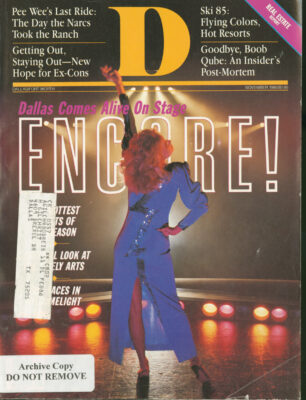A FRIEND OF mine, the number two man in a worldwide company based in Dallas, claims he has never read a book. But he doesn’t hang his head, shuffle his feet and “Aw, gee” about it as though he were ashamed. Not at all. He simply states it the way he might say, “I’ve never been to Tibet.” It is a neutral fact.
Now, I suspect this friend may underplay his acquaintance with books. I have trouble imagining how he or anyone could trek through 44 years without tripping over a couple of novels and a textbook or two. How does a youngster endure those interminable rainy days without Robinson Crusoe? What sort of young man braves life beyond the university unfortified by Salinger, Kafka, Thoreau, Mencken and Thurber?
My friend may somewhere have met Winnie the Pooh or Huckleberry Finn, but books have no place in his adult life. From our barroom conversations, it is clear that he hardly knows Mary McCarthy from Charlie McCarthy, William Faulkner from Danny Faulkner.
And yet he does read. For several hours a day he plows through The Wall Street Journal, Forbes, Fortune, Texas Business, Dallas (the Chamber of Commerce magazine) and a raft of others. As a result, his knowledge of business is overwhelming. Who is the new CEO of RepublicBank? Why is Mostek having troubles in the semiconductor market? What was the closing price of the special EDS class of General Motors stock?
“It’s all just gossip,” my friend explained over Chivas and soda the other night. “I’m a good gossip. I have to know as much as I can about my clients and their products, but I also like to be able to tell them a little inside stuff they haven’t heard. Who’s doing what to whom. Who’s making a killing in stocks. Who’s getting canned. You’d be surprised how many business deals depend on good gossip.”
Though I have met few individuals who so thoroughly shun literature, I think my friend may have captured an essential truth about business: Gossip is the intellectual gas that fuels the generators of commerce. Shards of fact. Scraps of rumor. These now oil the wheels of deals the way traveling salesman jokes did in an earlier time.
If gossip is the currency of business (pardon the shift in metaphor), business publications are the banks. According to Christine Urban, head of a Sharon, Massachusetts, market research firm specializing in media, the real information (in the sense of hard data) found in business publications is min-iscule. But the good ones are crammed with tidbits to serve with martinis, says Urban, who recently studied the Dallas market for the Times Herald. “My rule of thumb,” she says, “is that business people are the biggest gossips of all.”
UNTIL RECENTLY, Dallas media ignored this city’s gnawing hunger for business gossip. Oh, the local dailies carried stock market listings and haphazard reports of the new fannies in local board chairs. The Dallas/Fort Worth Business Journal, started in 1976, went a little farther, expanding corporate press releases whenever they seemed significant. It was not chewy stuff, though. Business news was still but a poor cousin to politics, recipes and the funnies.
Now, however, the media here have abruptly awakened to what might be called “The Gossip Gap.” And they have begun to address it with the kind of fervor Caspar Weinberger hurls into the missile gap. Top business stories have moved to page one of the Morning News and the Times Herald. TV stations have added business and economic reports to their regular menus of 30-second bites.
The sudden surge became dramatically apparent last spring when two local business publications were born only a couple of weeks apart. On April 22 came the Dallas Business Courier, a weekly tabloid published by a St. Louis company with similar papers in seven other cities. On May 6, the Times Herald introduced Dallas, Inc., distributed as part of the Monday paper but designed to remain on the corporate coffee table for days after the rest of the news is consigned to the dumpster.
With these added to the plethora of national, regional and local business publications, newsletters and trade magazines already crowding the executive in-basket, is it possible that the Dallas market is flooded? Are we on the verge of a fiercely competitive battle that will overshadow the highly overrated Dallas newspaper war? In the end, will a few casualties be left to die?
Publishers and editors of business journals here seem to believe in a market-glut theory. Robert Deitz, a former Times Herald business editor wooed back to pilot Dallas, Inc., says he would not have left a good job in public relations had he not expected long-term success in his current enterprise. But Deitz does speak of a shakeout among local journals as the business audience forms its habits and cements allegiances. Michael Sherrod, publisher of the Dallas Business Courier, uses the same word-shakeout-adding a platitude to the effect that the surviving publications will be those delivering quality.
But Christine Urban contends that a shakeout is by no means inevitable. In a commerce-oriented city like Dallas, she believes, the number of business publications that can survive and thrive is practically infinite. “I’m sure there’s a limit out there somewhere,” she says, “but I’ve never been able to find it. Especially not in Dallas. There comes a point where there’s too much local, national and international news. But business is a black hole.”
The gossip gap is the reason for the seemingly endless demand. The thirst for cocktail chatter is practically insatiable-and this means that the growing number of business publications all have high potential for success and may be able to coexist peacefully, all staking out their own turf. In fact, one of the few mistakes an editor or publisher could make is to enter into direct competition with another, similar journal. Repetition is the greatest mistake a journal can make. Business folks hunger for tasty tidbits, but they won’t swallow the same morsel twice.
“In business publications, you look at what is not being done and do that,” says Urban. “It is a totally different philosophy than in other sections of the newspaper or in other kinds of magazines. There you try to substitute for other publications. The Times Herald wants readers to depend on its front page instead of buying the Morning News. Newsweek tries to replace Time. In business news, though, you don’t have to substitute. You simply fill the gaps, and you’ll get the readers.”
The reason, she explains, is that only in business does the daily command of trivia affect a person’s future. “It’s bad if your boss mentions an article and you haven’t seen it. Your colleagues tend to doubt your motivation and dedication to the job.”
In the Dallas area, most existing publications have latched on to this essential fact of life in the gossip gap. Their editors and publishers use bureaucratese to describe Ur-ban’s black hole, but they make the same point. For example, Deitz at Dallas, Inc. explains, “The key to our success will be our definition and delineation of a market niche.”
Such niches are what remain after the competitors have laid claim to their territories, as witness the kinds of business news available in the Dallas market. Both newspapers, the Morning News and the Times Herald, command staffs of roughly two dozen journalists to report significant daily developments, the so-called “hard news.” Their daily business reports are to commerce and economics what their front pages are to plane crashes, politics and international affairs.
Beyond that, though, the Morning News defines the territory. It simply takes what it wants, and the other guys can do whatever is left. The Morning News dominates partly because of its enormous circulation lead, roughly 125,000 papers a day more than the Times Herald, and partly because, as the older and more conservative paper in town, it commands greater respect within the business community. More important, the Morning News entered the fracas early. Though other publications-including Texas Business, Dallas and the Dallas/Fort Worth Business Journal-already existed, it was the Morning News’ introduction of “Business Tuesday” five years ago that kicked off the current escalation in business reporting.
In choosing its ground, the Morning News made “Business Tuesday” a larger and more comprehensive hard news report. Though it includes occasional profiles and gossipy features, the focus is on analysis of current events. In “Business Tuesday,” you’re more apt to find a discussion of the effects of foreign products on Dallas companies or a survey of local housing markets than a chatty look at the growing popularity of mesquite broiling.
“News is first in our coverage,” says Morning News business Editor Cheryl Hall. “Features have to be a logical extension of the hard news. We sometimes have the cute feature or the personal feature that doesn’t need these ties, but those are not the stories we really want to fill ’Business Tuesday.’”
You can’t argue with success, and “Business Tuesday” is, undeniably, successful. But Hall’s approach leaves a lot of room in the gossip gap. “The personality profiles and cute features often contain the best information. What business readers really want is personality, maybe something a little catty.”
Both recent entries, the Dallas Business Courier and Dallas, Inc., take a lighter tone than “Business Tuesday.” They like features, profiles, even humor. Though these publications remain in the formative stages, their editors seem to know what they’re up to.
“I don’t think there’s any reason business news has to be drab and gray,” says Don Nauss, a former Times Herald reporter who now heads the staff of Dallas Business Courier. “Our kind of business journalism is mostly news features. I look for information that is unique and interesting.” Nauss adds that he hopes his paper can break a major story now and then, but admits that’s unlikely with an editorial staff of six. “It’s hard to imagine that a major story will escape the notice of 50 reporters and editors on the two dailies.”
To illustrate the stories that set his paper apart, Nauss points to a light profile of nationally syndicated redneck columnist Joe Bob Briggs (July 15), a slightly humorous story about the brash owner of a used car lot (May 27) and an offbeat report on Texas inventors (July 8). “The stories I like best are the ones that are fun to write and fun to read,” says Nauss.
With the Times Herald’s business staff of 22 at his disposal, Robert Deitz wants an interpretive, perhaps critical, approach to Dallas business. He hopes Dallas, Inc. will become a local version of Forbes or, better yet, of the National Observer, the now-defunct and sorely missed national newspaper where he once toiled.
“We are not near our objectives, yet,” Deitz concedes. “Our stuff is not as good, not as solid, as we want it to be. We expect to examine in depth, in detail, issues that are not being touched elsewhere. We expect to do a lot more proprietary stories that the other business papers either won’t do or don’t have the resources to do.”
As examples of articles he wants to stress, Deitz mentions an examination of huge profits at local hospitals (June 3), a look at how development in South Dallas threatens inner city neighborhoods (July 29), a story about how defense contractors resist free enterprise (August 12) and a survey showing a sharp decline in local corporation profits during the first half of this year (August 26).
Still, Deitz likes the gossipy items, too. Each issue of Dallas, Inc. features at least one executive profile which resembles, in tone, the breathless prattle of the Times Herald’s society section, “Unique.” Says Dietz: “People usually are ignored in business coverage. Some of our profiles have been among our most interesting stories. They may not be too useful. They are just interesting stuff.”
Dallas, Inc., incidentally, regularly reviews restaurants as potential sites for business lunches. Apparently, the theory is that business readers constantly prowl for the best places to spread the gossip.
Other Dallas business journals have staked out their own sectors in the black hole of business reporting. Texas Business fits local commerce into the broader perspective of Texas as a whole. Dallas serves a fixed constituency, members of the Chamber of Commerce, but it also specializes in surveys of large fields like banking and compiles prodigious catalogues such as its office building guide and high-technology guide.
THE ODD MAN out is the Dallas/Fort Worth Business Journal. Though it has survived in the area for almost nine years, the Journal apparently has lost its way in navigating the black hole. According to publisher Robert Morris, the weekly paper bets its future on hard news reporting. The emphasis, Morris says, is on expanding coverage of daily developments and analyzing them intelligently.
His plan sounds okay on the surface, but it ignores the realities of the gossip gap. “Business Tuesday” pre-empted the category some while back. And if the Morning News misses a few opportunities, the Herald’s Dallas, Inc. is there to fill the void. With an editorial staff of nine, Morris can hardly hope to compete head-to-head in the hard news arena. Stories such as the list of wealthiest people in the Dallas/Fort Worth area (August 26) are merely warmed-over Forbesian hash. They are redundant, and redundancy is the greatest sin in this business-hungry town.
In recent months, the Journal has shown telltale signs of trouble. Last fall, the weekly switched from paid circulation, which gave it about 8,000 subscribers, to controlled circulation, which boosted subscriptions to about 36,000. The current number puts the Journal comfortably ahead of the Dallas Business Courier, now selling only about 5,300 papers a week, but the 36,000 copies go to people who sent in cards saying they might look at the weekly if they got it free.
Nothing is inherently wrong with controlled circulation. Hundreds of magazines do quite well giving away their publications to selected groups of readers. And Morris says ad revenues for the Dallas/Fort Worth Business Journal are up some 250 percent over a year ago. But it usually is a symptom of hard times when a publication that people once paid for erases its price tag. This suggests that readers don’t value the information highly enough to lay out their money for it. In the case of the Journal, the switch may indicate that the increasingly crowded field is nudging one of the old-timers to the rail.
It would be unfortunate if competition crimped the Journal, especially when the gossip gap still yawns wide. I spoke about local media recently to the Greater Dallas Planning Council, a group of business and civic leaders here. In the conversations afterward, one message was plain: Business people want more business news. Despite the smorgasbord, they remain hungry. Business news is, in fact, a black hole.
With stories fresh and juicy and chock-fullof gossip, everybody out there ought to dowell. And it is a safe bet that business reporting will increase, either through greater emphasis in existing publications or through theintroduction of new ones. I’m sure my friendwill read anything to avoid being one-uppedover martinis at the Palm. Well, almost anything. It wouldn’t do to publish businessnews in book form. There’s no point inbreaking a perfect record.
Get our weekly recap
Brings new meaning to the phrase Sunday Funday. No spam, ever.
Related Articles

Commercial Real Estate
What’s the Key to Attracting Talent? These Three Frisco Developments Offer Answers
A trio of projects featured at an inaugural development summit previewed what they’ll bring to the table for employers—and for the talent.

Literature
Ben Fountain Wins Major Award!
The 2024 Joyce Carol Oates Prize goes to Dallas' own.
By Tim Rogers

Arts & Entertainment
Live Nation’s Concert Week Starts Today. Here Are the North Texas Tickets You Can Get for Cheap.
Missy Elliott, Janet Jackson, Dierks Bentley, Jennifer Lopez, Green Day, and more are coming to North Texas this year.


